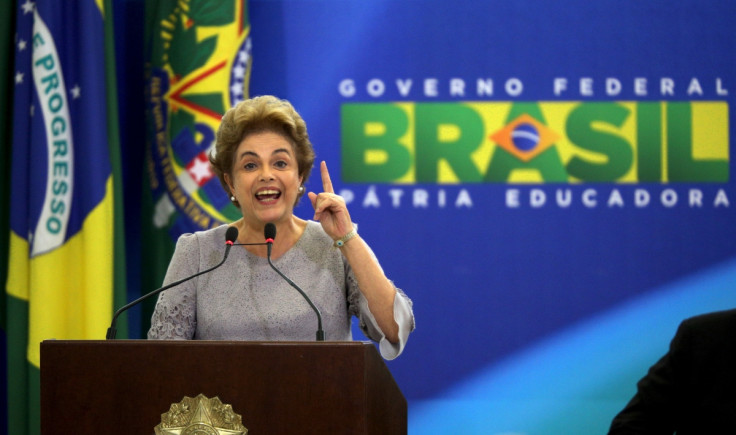Brazil: Impeachment looms for President Dilma Rousseff after biggest party quits coalition

The prospect of impeachment proceedings against Brazil's president Dilma Rousseff has drawn closer after the main coalition partner, the Brazilian Democratic Movement Party (PMDB), ended its alliance with her Workers Party (PT).
Senator Romero Juca, who is vice president of PMDB, the country's largest party, said it would withdraw from government and go into opposition, reducing Rousseff's chances of surviving an impeachment vote in April.
She needs to get the support of at least one third of the lower house of Congress to avoid an impeachment process. It would then need to get a two-thirds backing in the upper house Senate to end her beleaguered tenure as Brazil's head of state, although the actual removal of her from power could be a long drawn out affair.
David Fleischer, political expert from the University of Brasilia told Associated Press that the the PMDB's decision means that: "Impeachment has become irreversible. The president has no other way out".
Meanwhile, PMDB member Eliseu Padilha told AFP that Rousseff only had weeks left, telling the agency: "In less than three months we'll have a new government".
Impeachment proceedings
If impeachment proceedings went ahead, they would freeze her government for 180 days, sparking further uncertainty in the South American country which is facing its longest economic downturn since the 1930s and is set to host the Olympic Games in Rio de Janeiro. It is also the epicentre of the Zika virus.
Another round of protests to support Rousseff is planned for Thursday 31 March amid stiff resistance to her leadership left reeling due to allegations of involvement in a corruption scandal focused on the state oil company Petrobras. She is also accused of artificially boosting government accounts to help her win re-election in 2014, claims she has denied.
In less than three months we'll have a new government
Rousseff's interim replacement would be the head of PMDB and vice-president, Michel Temer. However Rousseff's supporters claim he is using the impeachment cause to divert attention away from allegations that he and other party members were also involved in the corruption scheme.
Pressure on her increased when she appointed former president Luiz Inacio Lula da Silva her chief of staff, a move her critics said would shield him from prosecution over accusations he was involved in the Petrobras corruption scandal, which he denies.
The Supreme Court will decide on whether he can take up the post.
© Copyright IBTimes 2025. All rights reserved.






















